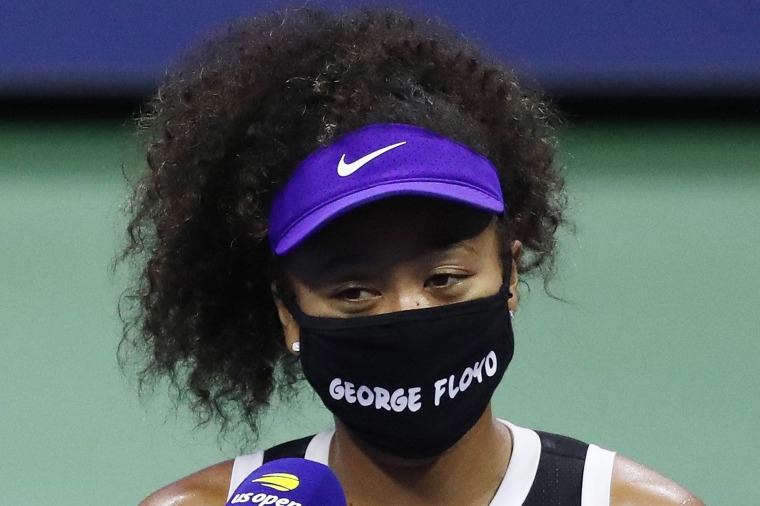Tennis star Naomi Osaka's decision to push back against the sport's authorities and share her mental health struggles has drawn support from across the sports world and boosted hopes that greater attention will be given to the pressures faced by athletes, particularly women and players of color.
Osaka withdrew from the French Open on Monday after clashing with officials over her desire to skip media interviews to prioritize her mental health.
The move has thrust her into the heart of an ongoing debate about what sports demand of athletes who compete at the highest levels — as well as the burden placed on minorities in traditionally white-dominated spaces.
Ranked No. 2 in the world, Osaka moved to the United States at age 3 and has Japanese and Haitian heritage. She said this week that she has "suffered long bouts of depression" since being catapulted into the global spotlight after an unexpected victory over Serena Williams in the U.S. Open in 2018.
Osaka said that she found some of the tournament rules for players "outdated" and "thought it was better to exercise self-care and skip the press conferences."
A number of Black female tennis players from the U.S. have expressed their support.
On Tuesday Coco Gauff said she admired Osaka's "vulnerability," while Serena Williams said it was important to remember that everyone was different when it came to handling the spotlight.
Sloane Stephens said Osaka should be applauded, adding that she hoped her decision would lead to more frank dialogue about the pressures many players face.
"A lot of people play through being miserable and being upset. ... I think instead of basically traumatizing her and making fun of her situation, we should be more accepting," Stephens said at a news conference after her first-round victory Tuesday.
"Feelings are real, and we're all human," she added.
Other athletes joined in the chorus of support, including NBA stars and Olympic champions.
But will Osaka's decision prompt lasting change?
Despite the solidarity from fellow athletes, some sports experts were critical of what they saw as a slow and inadequate response from tennis authorities.
French tennis officials initially threatened to suspend Osaka and fined her $15,000 for not participating in media interviews during the tournament.
However, on Tuesday, the four Grand Slam tournaments released a joint statement commending Osaka for sharing her experience and promising to make things better for players.
"On behalf of the Grand Slams, we wish to offer Naomi Osaka our support and assistance in any way possible as she takes time away from the court," the group said in a statement. "Mental health is a very challenging issue, which deserves our utmost attention."
The tennis community pledged to create "meaningful improvement" for players at all tournaments, the statement added, although it did not outline specific steps.
Download the NBC News app for breaking news and politics
"The French Open has mishandled the situation terribly and hurt themselves, and the game of tennis, in the process," Dan Kilvington, co-creator of the Talking Race podcast,told NBC News.
"Rather than reach out and support Osaka, tennis decided to sanction her. This has to change."
Kilvington said some of the media obligations faced by tennis players were "outdated" and that Osaka faced "additional scrutiny" for her stances, highlighting race and mental health.
"We must understand the additional pressures on minoritized ethnic athletes competing in predominantly white spaces, such as tennis. There becomes a burden of representation," Kilvington said.
At last year's U.S. Open, Osaka wore masks emblazoned with "George Floyd" and "Breonna Taylor" highlighting police brutality and the Black Lives Matter movement to her global fans.

"The additional responsibility of being a role model and trailblazer from a minoritized ethnic background has been overlooked by the event organizers," Kilvington added.
"The very fact that Black, Asian and minoritized ethnic people are more likely to suffer from mental health issues such as depression and anxiety has been ignored."
Osaka's sponsors, among them Nike and Mastercard, also lauded her courage in sharing her mental health experiences.
Leaders of the Japan Tennis Association said Osaka's health should be a top priority and a Japanese government official, Chief Cabinet Secretary Katsunobu Kato, told a news conference on Tuesday he would "watch over her quietly."
But for some critics, sports stars should not get special treatment given the riches on offer while Osaka's race and gender should be irrelevant.
"Are high-profile women of colour exempt from criticism regardless of their conduct? Sorry, I must have missed that woke memo!" tweeted British journalist Piers Morgan.
"I have a problem with high-profile people who exploit the media for huge financial gain and then attack the same media and use mental health as a weapon to silence criticism," he said in a separate tweet after writing a newspaper column on the issue this week.
Kevin Hylton, emeritus professor of equality and diversity in sport at Britain's Leeds Beckett University, called for better "pastoral support" for tennis players but acknowledged athletes have a "symbiotic relationship" with the world media.
He said the topic of mental health was becoming more openly discussed in other sports too, such as boxing and rugby.
"Sports people are more willing to talk about mental health but the key is whether their sports are willing to listen," Hylton told NBC News.
As a woman of color, Osaka would likely face issues of racism her white counterparts would not have to contend with, Hylton added, affecting her "psyche" and mental well-being.
"Too many people will keep these problems hidden. We need people to come out," Hylton said. "I think Naomi Osaka has done the tennis world and sports a favor."
